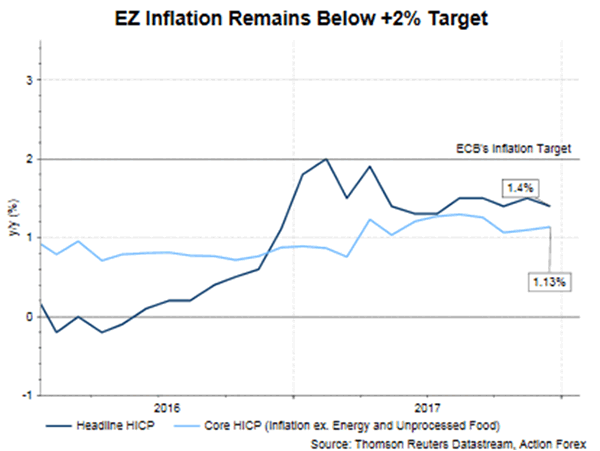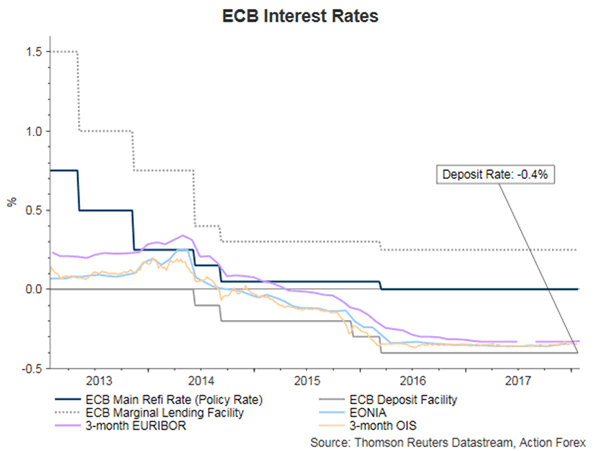ECB left the policy rates unchanged, with the main refinancing rate, the marginal lending rate and the deposit rate staying at 0%, 0.25% and -0.40% respectively. The pace of asset purchases also stayed unchanged at 30B euro per month until September, or beyond, if necessary. President Mario Draghi attempted to downplay speculations that the central bank would soon adjust the forward guidance, as interpreted by many following the December meeting minutes. Meanwhile, he stressed that any rate hike would be ‘well past’ the end of asset purchases. Draghi also warned of the impacts of the strong euro on growth and complained about the US for talking down the greenback at the World Economic Forum.
Policymakers remained concerned about the inflation outlook. As suggested in the accompanying statement, inflation ‘yet to show more convincing signs of a sustained upward trend’. As such ‘an ample degree of monetary stimulus remains necessary for underlying inflation pressures to continue to build up’. Regarding the language on headline inflation, ECB expected it to ‘hover’ in the coming months, compared with ‘moderate. It continued to expect underlying inflation to ‘rise gradually over the medium term, supported by our monetary policy measures, the continuing economic expansion, the corresponding absorption of economic slack and rising wage growth’.

Perhaps the most closely aspect of the meeting was the forward guidance. There was no change in January. At the press conference, Draghi emphasized that such discussion ‘has not really started’ and clarified that the wording in the December minutes suggested that the discussion on forward guidance would start soon, rather than the forward guidance would be adjusted soon. Meanwhile, Draghi reiterated several times that the following criteria are needed for the removal of monetary easing: inflation should be on a path that reaches the target in the medium term, ECB should be confident on the degree of convergence towards the target and convergence has to be self-sustainable.
Regarding the accelerated strength in the single currency recently, the central bank warned that ‘the recent volatility in the exchange rate represents a source of uncertainty which requires monitoring with regard to its possible implications for the medium-term outlook for price stability’. Meanwhile, Draghi was clearly discontent with US Treasury Secretary Mnuchin’s comments about a weak US dollar in recent days. He noted that ‘the use of language’ by some other parties ‘doesn’t reflect the terms of reference we have agreed’, pointing to the international agreement made last October on the commitment to not talk down a country’s currency. At the press conference Draghi added that ‘several members expressed concern, which was ‘broader than simply the exchange rate’ but was ‘about the overall status of international relations right now’. Recall that Mnuchin suggested at the annual World Economic Forum at Davos, Switzerland that ‘obviously a weaker USD is good for us as it relates to trade and opportunities’ and the currency’s short term value is ‘not a concern of ours at all’. Yet, he affirmed that in ‘longer term, the strength of the dollar is a reflection of the strength of the US economy and the fact that it is and will continue to be the primary currency in terms of the reserve currency’

